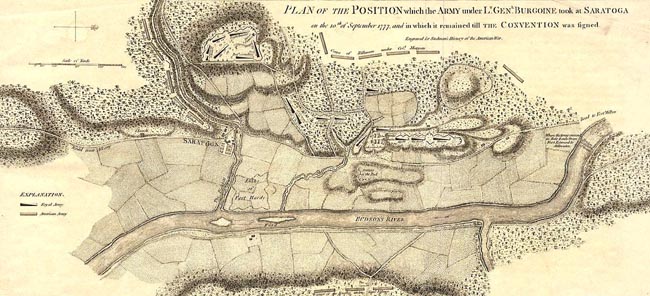
"We are now become so habituated to fire, that
the soldiers seem to be indifferent to it, and eat and sleep when it
is very near them."
-Thomas Anburey
Marching south from your winter encampments in Quebec, your regiment,
part of a force of nearly 7,200 men (although half of them are German
mercenaries,) under General Burgoyne on June 3, 1777 moves down to meet
General Howe's Army (moving North from New York) in Albany. (Barnett,
217)
Just as at home, the day begins early: marches begin at dawn, and keeping
in tight ranks, you advance at a steady clip of seventeen to twenty
miles a day. However, the farther south you move, the less hospitable
the landscape becomes-the New England woods are old and dense, creeks
and marshes cut through the terrain, and the sweltering summer heat
invites clouds of flies and mosquitoes that seem to hover over your
lines. As much time is devoted to felling trees, clearing roads and
building bridges (at least forty by your count), as is spent advancing,
and everyone in the company retires to their canvas tents exhausted
from the day's labors. (Frey, 103)
The halting pace has also made you easy targets for American guerillas
(the best marksmen in the world,) who wait with their hunting rifles
under cover of trees or fences to shoot honorable British soldiers in
the back. It is a testament to British training methods that you are
able to keep in line, even with American bullets whizzing towards your
mounted officers. Usually, these ambushes last only a few minutes, when
the colonists are spotted and killed, or more often, the rebel slips
away into the shadowy landscape. (Barnes, 60)


Even more alarming than these dangers, is the premature
depletion of salt rations due to the army's suspended progress. Having
failed to reach the Hudson River by August, you have begun to subsist
on simple cakes of flour and water, baked on stones in front of small
fires. (Frey, 103)
After engaging in several costly and dispiriting battles, and accumulating
many hundred British casualties, your force, led by General Burgoyne,
is attacked American General Horatio Gates' army at Freeman's Farm, halfway
between Saratoga and Albany. As traumatic as you find the action of the
battle, the aftermath-filled with the screams of wounded and dying comrades-is
exponentially more excrutiating. Officers and infantrymen-some from your
very own regiment-are bloodied by musket-balls, lacerated with bayonet
wounds, and disfigured by cannon-fire. Serving several hours on burial
detail, you can hardly keep from passing out as you walk around moaning
bodies-dying soldiers begging in German and English for some sort of nourishment.
(Frey, 103-104)